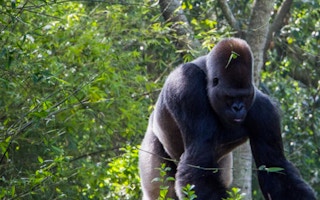Singapore-listed agribusiness giant Olam has responded to pressure from an environmental campaign group by agreeing to put a hold on forest clearing activity in Western Africa, and introduce new measures to cut peatland development and labour abuses out of its supply chain.
To continue reading, subscribe to Eco‑Business.
There's something for everyone. We offer a range of subscription plans.
- Access our stories and receive our Insights Weekly newsletter with the free EB Member plan.
- Unlock unlimited access to our content and archive with EB Circle.
- Publish your content with EB Premium.
Olam, which is majority owned by Singapore government investment vehicle Temasek, was linked to deforestation in Gabon in an investigation by Mighty Earth in December last year.
The report, titled Palm Oil’s Black Box, accused Olam of creating a “black box” for unethical palm oil growers to sell produce grown on deforested land, and lagging behind rival palm oil companies such as Golden Agri Resources, Musim Mas and Wilmar for not having a “zero deforestation” policy in place.
Olam denied the allegations, making the case that the company is playing an important role in reducing poverty and development in the African country where a third of the population lives below the poverty line. But two months after the report was published, the company has agreed to overhaul its supply chain and begin to phase out unsustainable farming practices.
After a meeting with Mighty Earth in Washington DC, moderated by think-tank World Resources Institute, the company has said it will stop developing forest land to make way for palm oil and rubber plantations in Gabon - a country with 85 per cent rainforest cover - for one year.
The company, which operates in 70 countries, trades in 47 agricultural commodities and brands itself as “the world’s largest farmer”, has also said that it will publish more information about its supply chain and require all of its suppliers to commit to avoiding developing land defined as high carbon stock.
Thisagreement applies only to Olam’s palm oil and rubber suppliers, and Mighty has said that will continue to investigate the company’s cocoa and coffee supply chains for potential environmental and social abuses.
The company’s updated palm oil policy includes the verification of palm oil suppliers considered to be “high-risk” using third-party auditors, and makes explicit reference to protecting areas of peat, carbon-rich soil on which highly biodiverse forests thrive.
In a move to improve the way it handles complaints from indigenous people living in and around its palm oil concessions, Olam has expanded itscomplaints mechanism to include its suppliers, and says it will protect the anonymity of those who use it.
As part of the agreement, Mighty will suspend its campaign against Olamand help draw up criteria for how the firmcan grow palm and rubber in highly forested countries sustainably.
During its campaign against Olam, Mighty used Olam’s connection to Temasek to apply pressure on the firm, claiming that Singapore’s national wealth fund “has fueled a secret vehicle for deforestation from Gabon to Indonesia.
But the group has updated its website to mark what it calls a “breakthrough agreement to protect forests, great ape habitat, and local communities in Africa and Asia.”
Mighty has also withdrawn a complaint about Olam made to the Forest Stewardship Council, the certification body that promotes sustainable forest management. Its report claimed that Olam’s operations in Gabon violated the firm’s commitment to FSC standards.
A final part of the agreement will see Olam and Mighty take part in stakeholder events with civil society groups and the Gabonese government to support the broad adoption of the high carbon stock approach to agroforestry.
Olam’s co-founder and group chief executive CEO, Sunny Verghese, said that the company was committed to sustainable agriculture best practice, reducing poverty and creating jobs, and hoped that countries like Gabon could “set their own pathways to sustainable development.”
Mighty Earth chairman Henry Waxman said that he hoped the agreement would provide a model for conservation in highly forested countries such as Gabon.
“While this agreement focuses on palm oil and rubber, we hope it creates momentum for action across commodities,” he said.

















